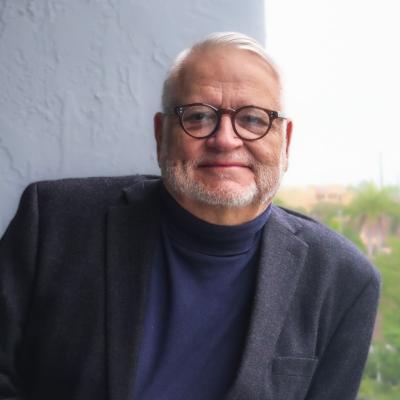
Lisandro
Pérez
Ph.D. University of Florida, August 1974. Sociology. Minor: Latin American Studies. Dissertation title: "An Analysis of the Migrant Population of Bogotá, Colombia." Major professor: T. Lynn Smith.
M.A. University of Florida, December 1972. Sociology. Minor: Anthropology. Thesis title: "The Growth of the Population of Cuba, 1953‑1970." Major professor: John Saunders.
B.A. University of Miami, June 1970. Major field: Sociology. Minors: English and Spanish
I was born in La Habana, Cuba, and emigrated to the United States with my parents in 1960. We settled in the Miami area, and I graduated from Hialeah High School in 1966. In 1970 I received a B.A. degree in Sociology and Anthropology from the University of Miami, with minors in English and Spanish. I was awarded a graduate research assistantship by the Sociology Department at the University of Florida, where I had the privilege to take courses from some of the foremost Latinamericanists of the time: Raymond Crist, Charles Wagley, Lyle MacAllister, John Saunders, Maxine Margolis, and, especially, my mentor in sociology, T. Lynn Smith. Not only did Dr. Smith direct my dissertation, on rural-urban migration patterns in Colombia in the age of la violencia, but he also recommended me for a faculty position at his former institution, Louisiana State University. During the ten years I was at LSU I was promoted to Associate Professor with tenure and served as Graduate Coordinator and as Acting Chair of Sociology and Rural Sociology. In 1985 I returned to Miami when I was hired as Associate Professor and Chair of the Sociology and Anthropology at Florida International University. After serving as Chair at FIU, I founded FIU's Cuban Research Institute and directed it for twelve years, a span of time that marked the ascendancy of the CRI as the premier university center for the study of Cuba and Cuban Americans, with more than 1.5 million dollars in support from the Ford, Rockefeller, MacArthur, and Christopher Reynolds foundations. We established the CRI Conference on Cuban and Cuban American Studies, which is still held today on a biennial basis, and at the CRI we also maintained a very active pioneer program of exchanges and collaborations with colleagues in Cuba. From 1999 to 2004, I edited Cuban Studies, the leading journal in the field, published by the University of Pittsburgh Press. In 2010, after 25 years at FIU, I accepted the position of Professor and Chair of the Department of Latin American and Latina/o Studies at John Jay College of the City University of New York, where I oversaw the establishment of a B.A. degree in that field, as well as spearheaded several initiatives designed to enhance the success of students. I have taken CUNY students to Cuba in study abroad programs during 2015, 2016, and 2020. I am proud to serve at John Jay, a Hispanic-Serving Institution, and in a Department that is the largest Latina/o Studies Department in CUNY, with a strong commitment to student success.
COURSES TAUGHT at John Jay College
Introduction to Latin American History
Race and Ethnicity in America
History of Contemporary Cuba (taught thrice in Cuba as a Study Abroad course)
Latina/os and Justice in New York City
Revolution and Social Change in Latin American Literature and Art
Research Methods
Senior Capstone Seminar
COURSES TAUGHT at Florida International University:
Introduction to Sociology Research Methods
Marriage and the Family World Issues and Prospects
Classical Sociological Theories Cuban Culture and Society
Cubans in the U.S. Senior Capstone Seminar
Seminar: Sociology of International Development
Seminar: Cuba
Member, Scholarly Advisory Board, National Museum of the American Latino, Smithsonian Institution, 2020-
Member, Scholarly Advisory Board, Gilder Lehrman Institute of American History, 2020 -
Senior Honorary Member, Cuban Studies Advisory Board, 2017 - 2024
Member, Latin American Studies Association, 1973 -
See vita for complete listing of publications
Lisandro Pérez. 2023. The House on G Street: A Cuban Family Saga. New York University Press. 327 pp.
Lisandro Pérez. 2018. Sugar, Cigars, and Revolution: The Making of Cuban New York. New York University Press. 400 pp.
Lisandro Pérez. 2019. Azúcar, tabaco y revolución: la forja del Nueva York cubano. La Habana: Fondo Editorial Casa de las Américas. Translated by Eloísa Le Riverend Morales. 454 pp.
Guillermo Grenier and Lisandro Pérez. 2003. The Legacy of Exile: Cubans in the United States. Boston: Allyn & Bacon (New Immigrants Series).
Prize for Scholarly Excellence in Cuban Studies, awarded by the Cuban Section of the Latin American Studies Association. Annual prize for lifetime achievement in the field. 2023.
Faculty Scholarly Excellence Award, Office for Advancement of Research, John Jay College. 2021.
Herbert H. Lehman Prize for Distinguished Scholarship in New York History, awarded by the New York Academy of History for Sugar, Cigars, and Revolution: The Making of Cuban New York. 2020.
Honorable Mention for best book published in 2016-2018 on Latino/as in the United States, awarded by Casa de las Américas, Havana, for Sugar, Cigars, and Revolution: The Making of Cuban New York. 2019
My research has focused on Cuba and on Cuban Americans. I have published about my country of birth and its diaspora using a wide range of multidisciplinary approaches: sociology, demography, history, anthropology, and economics. In Sugar, Cigars, and Revolution: The Making of Cuban New York (NYU Press, 2018) I tell the important story of the Cuban presence in New York throughout the nineteenth century, when Cuban New York became the largest Latino community east of the Mississippi, fueled by the sugar trade and the struggles that sought to free Cuba from Spanish colonial control. My most recent published work, The House on G Street: A Cuban Family Saga (NYU Press, 2023), is a highly personal yet thoroughly researched book that tells the story of a nation through generations of my family who lived through the transformations that characterized Cuban society as it lurched from colony to republic and to revolution.